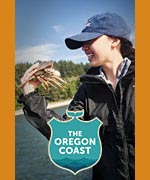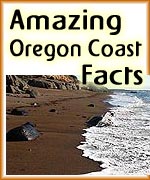 |
‘Season of Seals’ Brings Concerns to Oregon Coast
Published 2006
Photos courtesy Seaside Aquarium
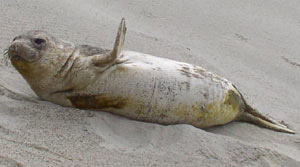 |
| Seal in Manzanita this winter |
(Oregon Coast) - This winter and spring has seen various creatures washing up on shore or resting on the beaches. and that, combined with the increase in visitors, has some experts on the coast concerned.
In late March, a seal pup wandered onto the beaches of Seaside, simply resting for a while. In February, a one-year-old elephant seal ended up on a Manzanita beach, causing a stir. Also this winter, the body of a sea lion was found decapitated on a beach north of Gearhart.
While none of these incidents are related, they cause coastal officials to remind the public to stay away from anything living or dead that washes on shore.
“Well-meaning people who remove seal pups from beaches are eliminating the possibility of the pup being reunited with their mother,” said Tiffany Boothe, of the Seaside Aquarium. “They’re also violating the Marine Mammal Protection Act (MMPA) and they may face criminal and or civil penalties. The best thing for you to do is to keep well away from this seal pup, thereby reducing stress on the pup and or alarming its mother.”
Boothe said touching these creatures presents possible health problems. Any kind of marine mammal found dead or alive poses a potential health risk, and untrained people coming into contact with them risk exposing themselves, domestic animals and marine mammals to various types of diseases.
This also means you should keep an eye on your pets around these corpses.
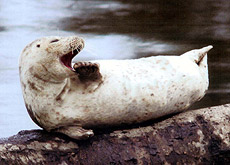 |
| Seal near Seaside in March |
When the decapitated sea lion was found this winter, Seaside Aquarium’s Keith Chandler said whoever committed that crime also exposed themselves to serious health risks. The potential for coming into contact with bacteria is much greater when an act like this is committed.
The young elephant seal in Manzanita caused some very protective behaviors from locals. Boothe and Chandler also volunteer for the Marine Mammal Stranding Network, which comes to the aid of such creatures, or retrieves the bodies of aquatic creatures that wash up on shore. When they arrived in Manzanita to put up signage keeping the public away from the seal, one local actually tried to chase Boothe away.
The elephant seal was on the beach for its first molting.
“Molting is when seals shed their fur,” Boothe said. “This often leaves them with small sores which are irritated by salt water, which is one reason they rest on the beach. The other is that once out of the water their body temperature rises and they are able to molt a bit faster.”
Chandler said this process is visibly painful to public eyes, and misunderstandings about this natural occurrence have resulted in park rangers or others taking drastic action.
“One reason the Marine Mammal Stranding Network was created was to educate the public about this,” Chandler said. “We’ve had park employees who’ve put these animals down, thinking they were putting them out of their misery. But we’re trying to make sure they understand this is a normal process.”
Do not touch any creature, dead or alive, on the beach. To report other incidents of marine mammal strandings on Oregon beaches, call 1-800-452-7888.
More About Oregon Coast hotels, lodging.....
More About Oregon Coast Restaurants, Dining.....
 |
 |
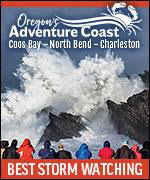 |
 |
Keywords: geology, cape kiwanda, topography, geography, fossils, Pacific City, Cannon Beach, Yachats, Depoe Bay, Newport, Lincoln City, Oceanside, Astoria, Oregon coast, science.
LATEST OREGON COAST NEWS STORIES
Back to Oregon Coast
Contact Advertise on BeachConnection.net
All Content, unless otherwise attributed, copyright BeachConnection.net Unauthorized use or publication is not permitted
Secrets of the Season |
Unusual Travel Articles TravelParanormal.com allows you to submit your own creepy tale or debunk one - or see up-to-the-minute news headlines about travel and the paranormal. News Headlines from All Over Oregon Need to scan Oregon headlines? Constantly updated news from all over Oregon: a comprehensive, up-to-the-minute display of news headlines from a variety of media |














